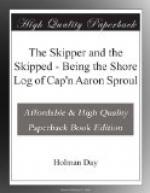When he hurried out of the bank with various thick packets stowed about his person, he headed a straight course for the police-station.
In the marshal’s office he found Colonel Gideon Ward, voiceless, frantic, trembling—licking at the point of a stubby lead-pencil that had been shoved into his grasp, and trying to compose his soul sufficiently to write out some of the information about himself, with which he was bursting.
“There ain’t no call for this man to write out the story of his life,” declared Cap’n Sproul, with an authority in his tones and positiveness in his manner that did not fail to impress the marshal. “He is my brother-in-law, he is Colonel Gideon Ward, of Smyrna, a man with more’n a hundred thousand dollars, and any one that accuses him of bein’ a thief is a liar, and I stand here to prove it.”
And to think there was no one present except the Colonel to appreciate the cryptic humor of that remark!
The Cap’n avoided the demoniacal gaze that Ward bent on him and disregarded the workings of that speechless mouth. Sproul shoved his hand deep into his trousers pocket and pulled out a roll of bills on which the teller’s tape had not been broken. At this sight the Colonel staggered to his feet.
“Here!” cried the Cap’n, shoving money into the hand of the officer who had made the arrest. “There’s something to pay for your muddy clothes. Now you’d better go out and find the man that started all this touse about a leadin’ citizen. I’ll sue this city as a relative of his if you don’t let him go this minute.”
And they let him go, with an apology that Colonel Ward treated with perfectly insulting contempt.
Cap’n Sproul faced him on the street outside the prison, standing prudently at guard, for he perfectly realized that just at that moment Colonel Gideon Ward had all the attributes of a lunatic.
“You can see it bulgin’ all over me,” said the Cap’n, “all tied up in bundles. I don’t say my way was the best way to get it. But I’ve got it. I suppose I might have gone to law to get it, but that ain’t my way. Of course you can go to law to get it back; but for reasons that you know just as well as I, I’d advise you not to—and that advice don’t cost you a cent.”
For a full minute Colonel Ward stood before him and writhed his gaunt form and twisted his blue lips and waggled his bony jaws. But not a sound could he utter. Then he whirled and signalled a trolley-car and climbed on board. With intense satisfaction the Cap’n noted that the car was marked “Union Station.”
“Well, home is the best place for him,” muttered the Cap’n; “home and a flaxseed poultice on his chist and complete rest of mind and body. Now I’ll settle for that schooner, hunt up Hime Look and that pertickler and admirin’ friend of his, that infernal elephant, and then I reckon I’ll—eraow-w-w!” he yawned. “I’ll go home and rest up a little, too.”




